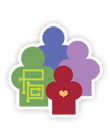
The development of the PRIDE Digital Curriculum (PDC) was funded by the U. S. Department of Education’s Learning Anytime, Anywhere Program, designed to provide educational opportunities for individuals who are unable to easily access traditional methods of training. Resource families fit these criteria, as their responsibilities caring for children with multiple needs may make it difficult for them to attend training outside of their homes.
The PRIDE Digital Curriculum provides a consistent and standardized version of the PRIDE (Parent Resources for Information, Development, and Education) caregiver training that is used in 30 states, 6 Canadian Provinces, and 17 European countries. It evolved from the PRIDE Core (In-service training) modules that have been available in print book form since the program was developed. The Online and CD-ROM versions are a derivative of the same material, with some updates and modifications, contained in each of the nine module’s trainer guides and participant workbooks (PRIDE books).
The PDC program is designed to teach knowledge and skills in five essential competency categories:
|
Within each session, a child welfare professional and a foster parent professional greets the at-home learners and guide them through each module. The modules are comprised of one to four sessions and each session takes at least three hours to complete.
The PRIDE Digital Curriculum (PDC) was developed to strengthen an agency’s overall capacity to provide ongoing professional development for its entire cadre of resource families. PDC is not intended for replacing the classroom training or face-to-face interactions with resource families, but instead offers a media-based, interactive training tool that can be used in various training modalities. This format can be presented in a classroom setting while using internet access and a projector screen, one-on-one sessions with a worker and a laptop, or as an anytime/anywhere alternative for individual learners on their own.
Through this digital format, at-home learners meet other experienced foster parents, adoptive parents, child welfare workers, former children in care, adults who were adopted earlier, and child welfare program managers. In each session the at-home learners have an opportunity to hear from these contributors regarding their life/work experiences and suggestions related to particular issues that are covered. The interactive classroom exercises have been transformed into media exercises and written case studies are now dramatized. Because of the nature of the linear instruction, the learners must participate in every activity.
For more information about the PRIDE Digital Curriculum and how it can be obtained and licensed, contact us at 708.534.4094 or email at sales@pridedigital.org.
|
PRIDE Module of Practice: View | |||
PRIDE Digital Curriculum Partners: View | |||
|
| |||
